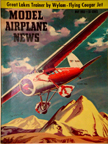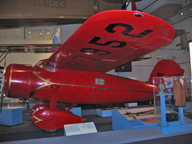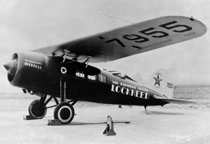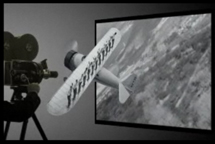May, 1956

Lockheed "Vega"
Model Airplane News Cover Art for May, 1956
by Jo Kotula
Click to Enlarge
The Vega was a six-passenger monoplane built by the Lockheed company starting in 1927. It became famous for its use by a number of record breaking pilots who were attracted to the rugged and very long-ranged design. Amelia Earhart became the first woman to fly the Atlantic single handed in one, and Wiley Post flew his around the world twice.



Lockheed "Vega"
Click to Enlarge
Designed by John Knudsen Northrop and Gerrard Vultee, both of whom would later form their own companies, the plane was originally intended to serve with Lockheed's own airline routes. They set out to build a four-seat aircraft that was not only rugged, but the fastest aircraft as well. Utilizing the latest designs in monocoque fuselages, cantilever wings and the best engine available, the Vega delivered on the promise of speed.
The fuselage was monocoque, built from sheets of plywood, skinned over wooden ribs. Using a large concrete mold, a single half of the fuselage shell was laminated in sections with glue and then a rubber bladder was lowered into the mold and inflated with air to compress the lamination into shape. Two fuselage halves were then nailed and glued over a previously made rib framework. With the fuselage constructed in this fashion, the wing spar had to be kept clear, so they decided to make a single spar cantilever mounted on the very top of the aircraft. The only part of the aircraft that wasn't particularly streamlined was the landing gear although production versions wore sleek "spats".
The first Vega 1, named the Golden Eagle, flew from Lockheed's Los Angeles plant on July 4, 1927. It could cruise at a then-fast 120 mph, and had a top speed of 135 mph. However. the four-passenger (plus one pilot) load was considered too small for airline use. A number of private owners placed orders for the design however, and by the end of 1928, they had produced 68 of this original design. In the 1928 National Air Races in Cleveland, Vegas won every speed award. Looking to improve the design, Lockheed delivered the Vega 5 in 1929. Adding 450 hp engine allowed two more seats to be added. A However, even the new six-seat configuration proved to be too small, and the 5 was purchased primarily for private aviation and executive transport. A total of 64 Vega 5s were built. In 1931, the US Air Corps bought two Vega 5s

Lockheed "Vega", Mark 2
...in Popular Mechanics August, 1938 Click to Enlarge
As indicated in the Popular Mechanics article above, in the mid 1930s, Lockheed had redesigned the Vega to make an airplane that was as comfortable as an automobile. This twin-tailed low-wing monoplane became the design basis for the .
Here is a video of the Lockheed "Vega":
The Vega (or a model thereof) is one of the stars of the 1933 film Flying Down to Rio which is noteworthy for two things:
- It was the first film in which Fred Astaire and Ginger Rogers danced together
- It features an "Aerial Ballet" with scantily clad girls dancing on the wings of airplanes (while flying over Rio de janeiro
We believe that one of the plane in the film is the Lockheed Vega. In the film, it is only shown from one view, leading us to believe that it was a model. We have studied the dancers on the wing and feel that they are an actual chorus line (not little clay figures as the photo on the left would suggest). This shot was probably done with a double traveling mat in which the model was superimposed on the background and then the dancers were superimposed on the wing. Although the Vega was a very good airplane, we do not believe it was capable of lifting twelve dancers on the wing.



The Lockheed Vega as Inspiration for a Tricky Shot
Click to Enlarge
Click Here for more information about the Lockheed "Vega".

Click to go back and select another cover.
Counter for the Entire Site (not just this page..)
Home | About Lindy | Last Week's Reviews | Upcoming Events | 1940s Collecibles
The Guide - Establishments - Travel - Accessories
Music | Links | Photo Gallery | Extras | Contact